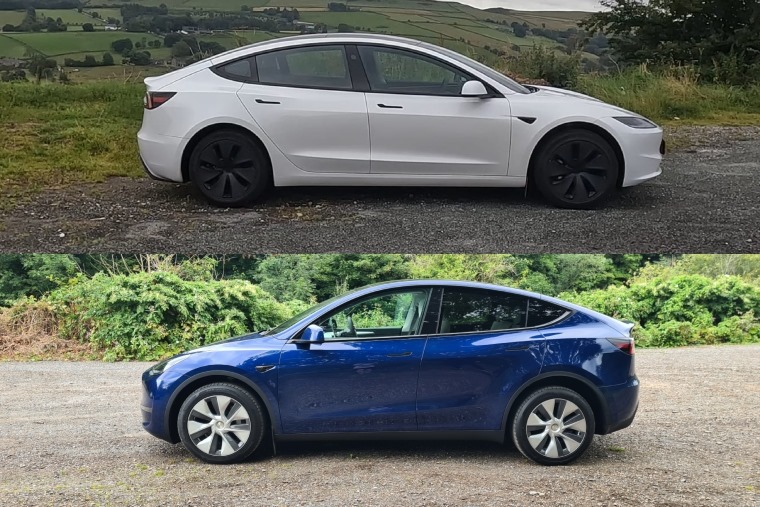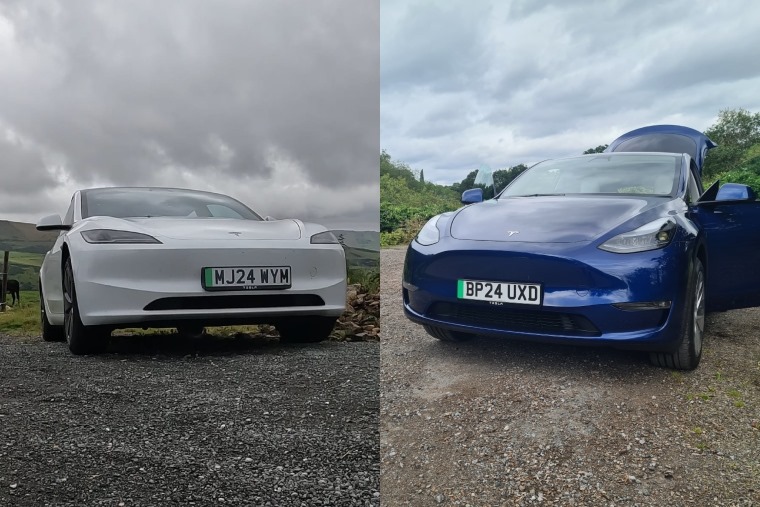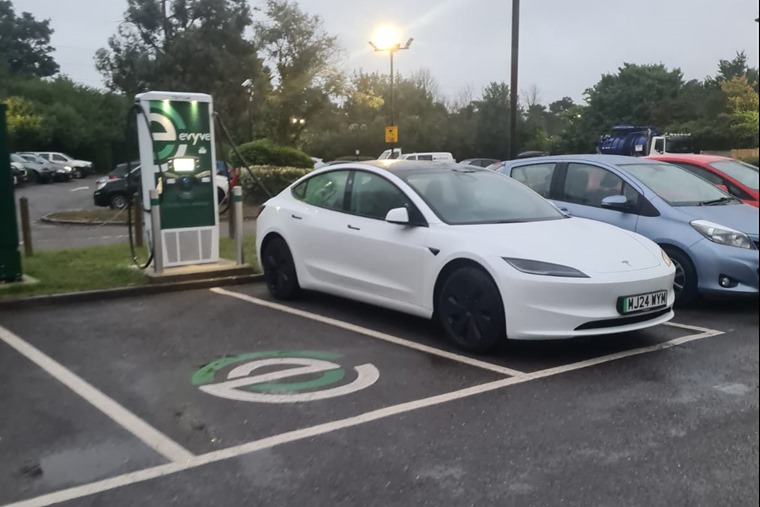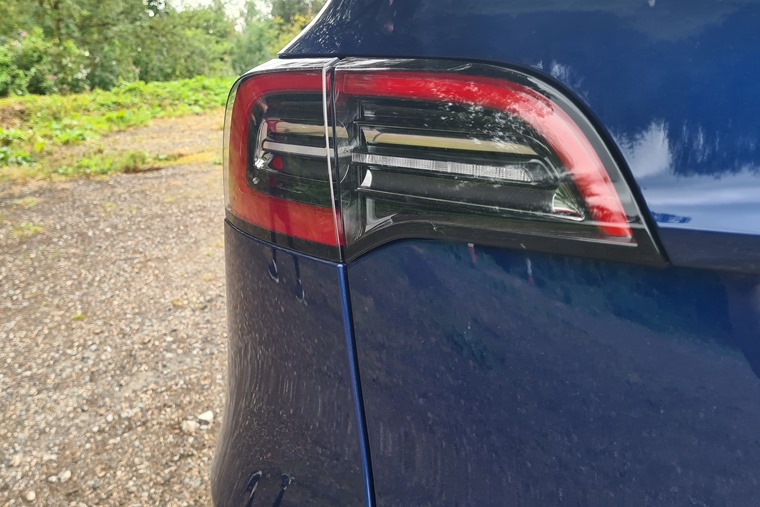Model 3 vs Model Y | Two weeks. Two Teslas. Which one wins?
Few manufacturers have moved the game on and had such a significant impact as Tesla. It’s now more than a decade since the launch of the original Model S, but these days its range in the UK is focused around two, more affordable compact models: the Model 3 and Model Y.
They’re massively popular, and are still the pair that other manufacturers aim to beat when it comes to creating an EV. We’ve recently had the pleasure of sampling both models at Leasing.com, and our time with the Teslas proved that few other manufacturers come close when it comes to creating such a well-rounded EV.
But what about when you put the Teslas directly against each other? Is one a smarter choice than the other? Is the Model Y really more practical? What about range and charging? We’ve compared the Model 3 and Model Y in all the key areas to help you work out which one would work best for you.
Tesla Model 3 vs Model Y: The looks
The Model 3 gets an all-new aerodynamic front end, meaning the Model Y is no longer the new kid on the block.
We’ll start with the fresher of the pair, the Model 3. One criticism many have had about Teslas is the looks, and the Model 3’s recent revamp is aimed squarely at addressing that concern. The biggest change is up front.
Styling tweaks aim to reduce drag and have helped make sure the Model 3 is more efficient than ever before.
A new set of headlights and bumper design have dramatically changed the car’s face, and it should still look fresh in a few years. While its overall silhouette has been left unchanged, at the back there’s a neater, sharper set of tail lights too.
It all comes together to give the car a more premium and classy look than before. It’s not just appearances either; the changes aim to reduce drag and have helped make sure the Model 3 is more efficient than ever before.
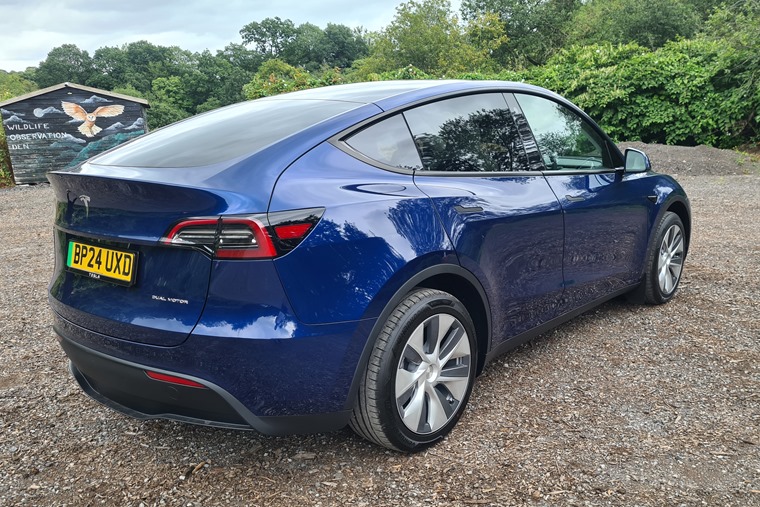
The Model Y’s SUV proportions make it the more practical of the pair.
While it shares a lot of the 3’s DNA, the Model Y’s crossover dimensions mean it’s taller and larger than the smaller saloon.
From an aesthetic point of view it’s not quite as clean as the Model 3.
While it does offer more practicality and ensures a high driving position, from an aesthetic point of view it’s not quite as clean as the Model 3 – particularly because it hasn’t yet benefited from the same freshen up the Model 3 did earlier this year.
It’s a large car, and certainly has more road presence than the smaller car. That said, we think the new Model 3 is still the winner when it comes to outright style and design. Of course, design is always subjective, but with a lower, sleeker profile, the Model 3 always had this one in the bag really.
Tesla Model 3 vs Tesla Model Y: The tech
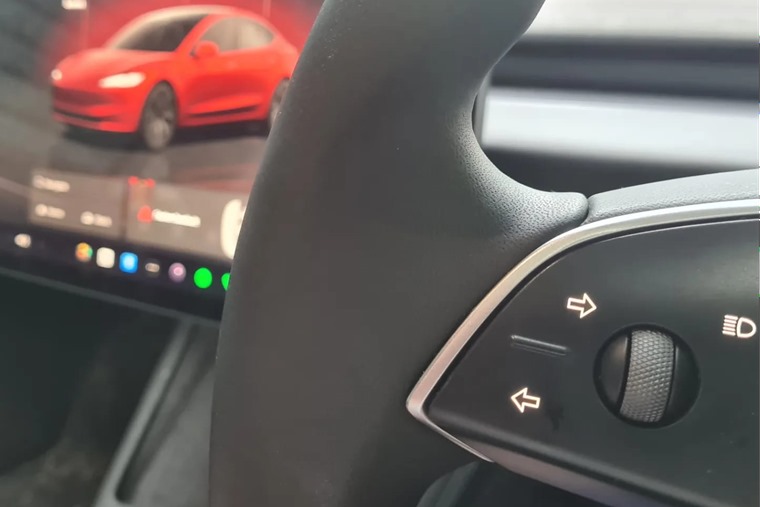
The Model 3 doesn’t get an indicator stalk – the controls are on the steering wheel.
You should think of Tesla as more than just a car company. First and foremost, it’s a tech company. And that’s immediately obvious when you sit in the driver’s seat. Whether you pick the 3 or the Y, there’s nothing that quite comes close to the Tesla experience.
There's no stalks behind the wheel at all, or even a gear selector.
The Model 3 benefits from a few notable changes over the Model Y. That means you get no stalks at all, or even a gear selector. P, R, N and D can be found on the 15.4in touchscreen, while the indicators are now operated via haptic buttons on the steering wheel.
In fact for 99% of the car’s functions, you’ll need to use the screen. While this is somewhat of a technological feat, for things like the heated seats, it can seem a little over complicated.
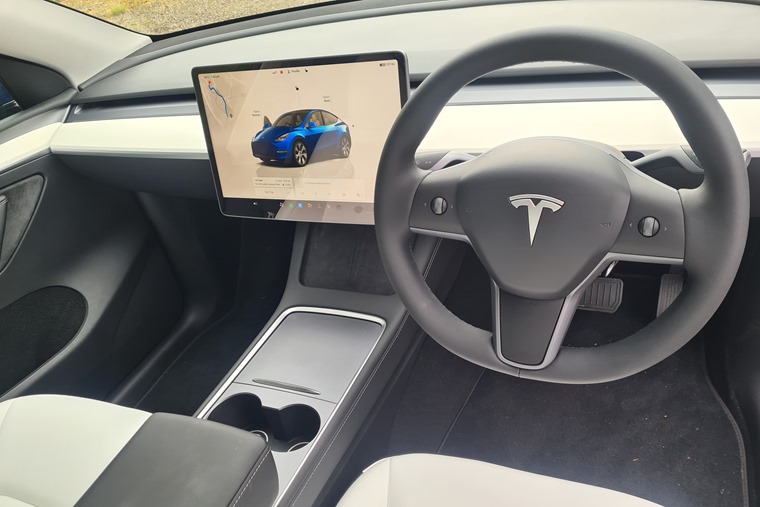
The Model Y gets the same screen, but keeps traditional stalks for indicators and gears.
The Model Y retains the 15.4in touchscreen, but at the moment you still get a proper indicator stalk and physical gear selector. Neither models are available with a head-up display which is quite unusual, but there are some neat touches.
Take the dual wireless phone charger in the centre console – both you and your passenger can charge without having to swap phones out.
Watch our full review of the latest Model 3.
Both cars also feature some nice kid-friendly touches, like Tesla’s “Toybox” which gives you access to some fun little easter eggs and games you’d never dream of finding in any other car.
Tesla’s “Toybox” which gives you access to some fun little easter eggs and games.
There’s also cinema mode to consider, which allows you and your passengers to stream content directly from YouTube and Netflix – particularly handy if you’ve got the rear entertainment pack which gives back passengers their own touchscreen and display.
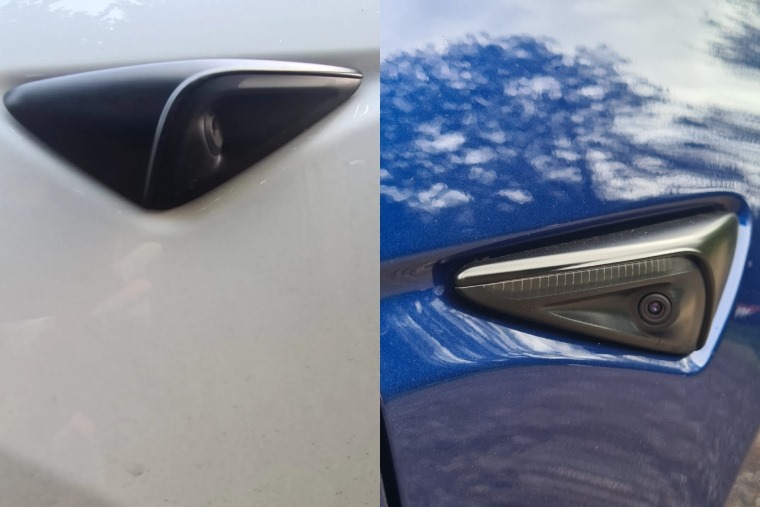
Teslas feature multiple sensors and cameras, giving it one of the most advanced driver assistance systems on the market.
You can’t talk about Tesla without at least mentioning Autopilot. This optional advanced system means the car can pretty much drive itself in certain circumstances.
It can control the throttle, brake and steering and ensure you maintain a safe distance from the car in front at all times. Technically, these cars are capable of driving themselves, but legislation in the UK means you still have to keep your hands on the steering wheel to take advantage of these features.
Tesla Model 3 vs Model Y: The practical stuff
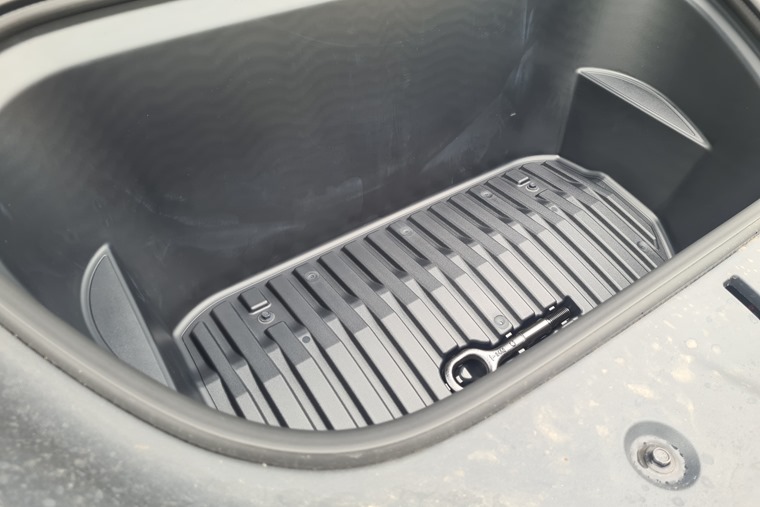
Both models feature a “frunk”, with the Model Y’s being the most impressive.
This is where the pair diverge for obvious reasons. The Model 3’s saloon shape means it’s by nature a little bit smaller. But the new version is more practical than ever.
The cabin is spacious enough and, between the “frunk” and rear boot, you get a fantastic 594 litres of luggage capacity – that’s plenty enough for most daily activities, but families and those that regularly go on longer trips might find it a little limiting compared to the Model Y.
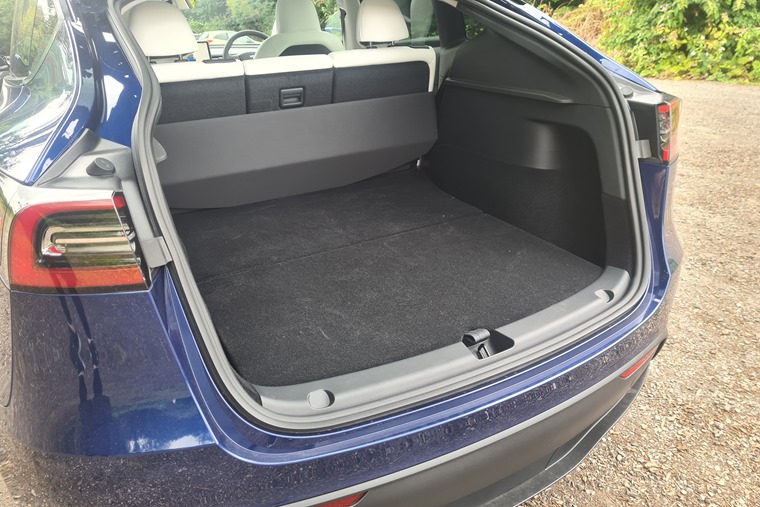
854 litres of cargo space make the Model Y the clear practical winner.
The crossover model is by contrast, cavernous. There’s a whopping 854 litres of cargo capacity, which expands to more than 2,000 litres if you drop the rear seats. This, combined with that extra bit of headroom, means the Y is the clear winner.
That said, Tesla has taken steps and improved the Model 3’s practicality too. Between them, they’re two of the most practical EVs currently available.
Tesla Model 3 vs Model Y: Driving
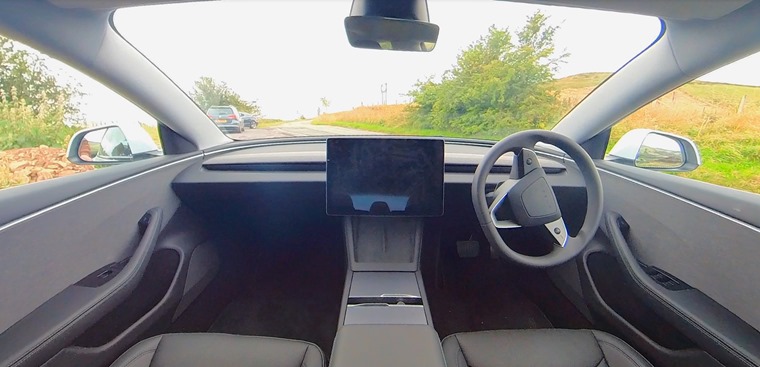
The Model 3’s cabin is even more minimalist than the Y’s.
Drive either of these cars and you’d be forgiven for thinking Tesla has been making and developing cars for much longer than it has. They are both available in single and dual motor form and, even in their least potent guise, offer sports car-like acceleration.
The Model 3 Performance gets from 0-6mph in just 3.1 seconds, while the Y Performance manages it in 3.5 seconds – those figures aren’t far from supercar territory.
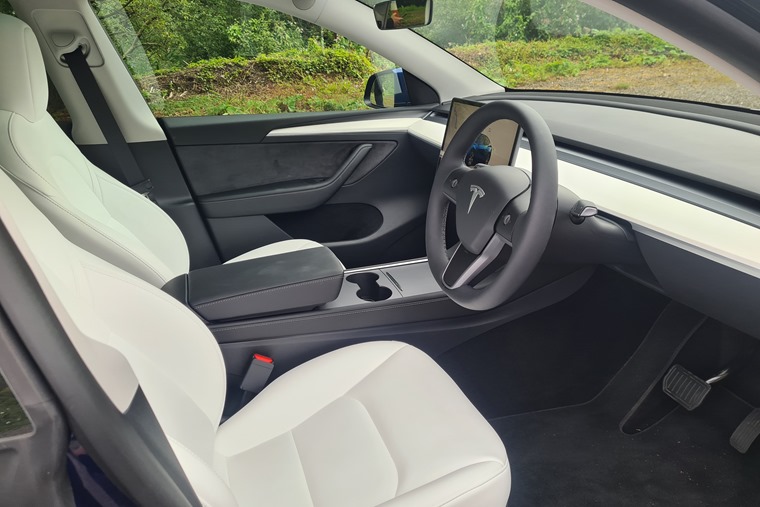
Bright white interior is optional on both models.
The Model 3’s lower centre of gravity and weightier steering gives it a genuine sporty feel to drive too, offering sharp handling and a truly connected driving experience which is relatively rare in the world of EVs. The Model Y is larger, heavier and less engaging, but it still offers an impressive drive and is slightly more cossetting over bumps.
Tesla Model 3 vs Model Y: Charging & range
Both models are available in three guises: Rear-wheel drive, Long Range All-wheel drive and Performance All-wheel drive. Long Range and Performance models get a 79kWh battery pack, while the single-motor models get a smaller 60kWh unit.
Whichever one you pick, the max charging speed is an impressive 250kW.
Whichever one you pick, the max charging speed is an impressive 250kW and, using one of Tesla’s excellent Superchargers, you can expect an 80% recharge in less than half an hour.
Charging is simple, whether using a Tesla Supercharger or other rapid charger.
In fact, the charging infrastructure Tesla employs is one of the brand’s stand-out features. In the UK, you’ll find Tesla Superchargers across the motorway network, as well as some Tesla distribution centres. You can of course use other rapid chargers, but unlike Tesla’s superchargers these often require an app or card to operate. With a supercharger, you simply park up, plug in and you’re done.
With a supercharger, you simply park up, plug in and you’re done.
This, combined with the class-leading ranges of both these models, mean the pair are truly usable EVs and don’t come with any baggage related to range anxiety. Even the rear-wheel drive models with smaller batteries are capable of 283 miles (Model Y) and 318 miles (Model 3).
In the Model 3, opting for the Long Range model ups this to 390 miles, and 331 miles in the Model 3. Thanks to its slippery shape, it means technically the Model 3 does have the edge when it comes to outright range.
Tesla Model 3 vs Model Y: Which one’s for you?
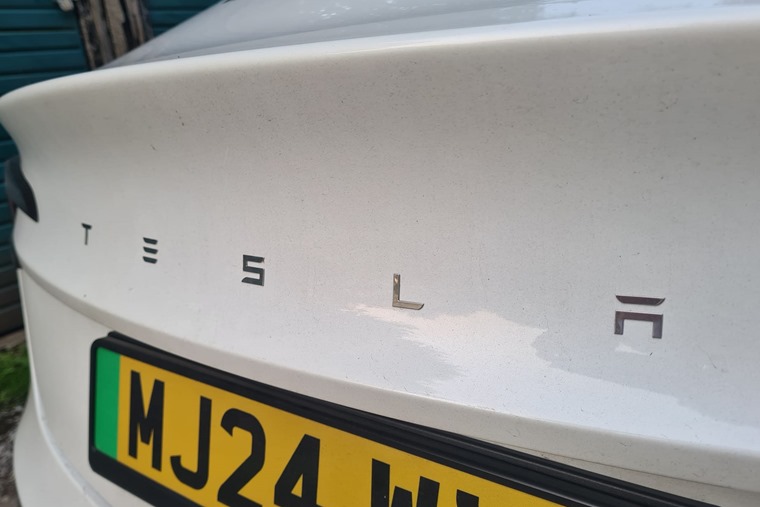
Choosing between the Tesla Model 3 and Tesla Model Y ultimately comes down to your needs and lifestyle. If you’re looking for a sleek, sporty sedan with top-notch performance and the latest tech, the Model 3 is a fantastic choice. It’s perfect for individuals or small families who don’t need a ton of space and prefer a more traditional car feel.
However, if you need more space, higher seating, and the option for more passengers, the Model Y’s crossover design makes it a more versatile option. It’s ideal for families, road trips, or anyone who wants the benefits of an SUV with the performance and efficiency of an electric vehicle.
Choosing between the Tesla Model 3 and Tesla Model Y ultimately comes down to your needs and lifestyle.
Both models are excellent, but your choice will depend on whether you prioritize the sportiness and compact size of the Model 3 or the space and versatility of the Model Y. Either way, you’re getting a cutting-edge electric vehicle that offers a glimpse into the future of driving.

